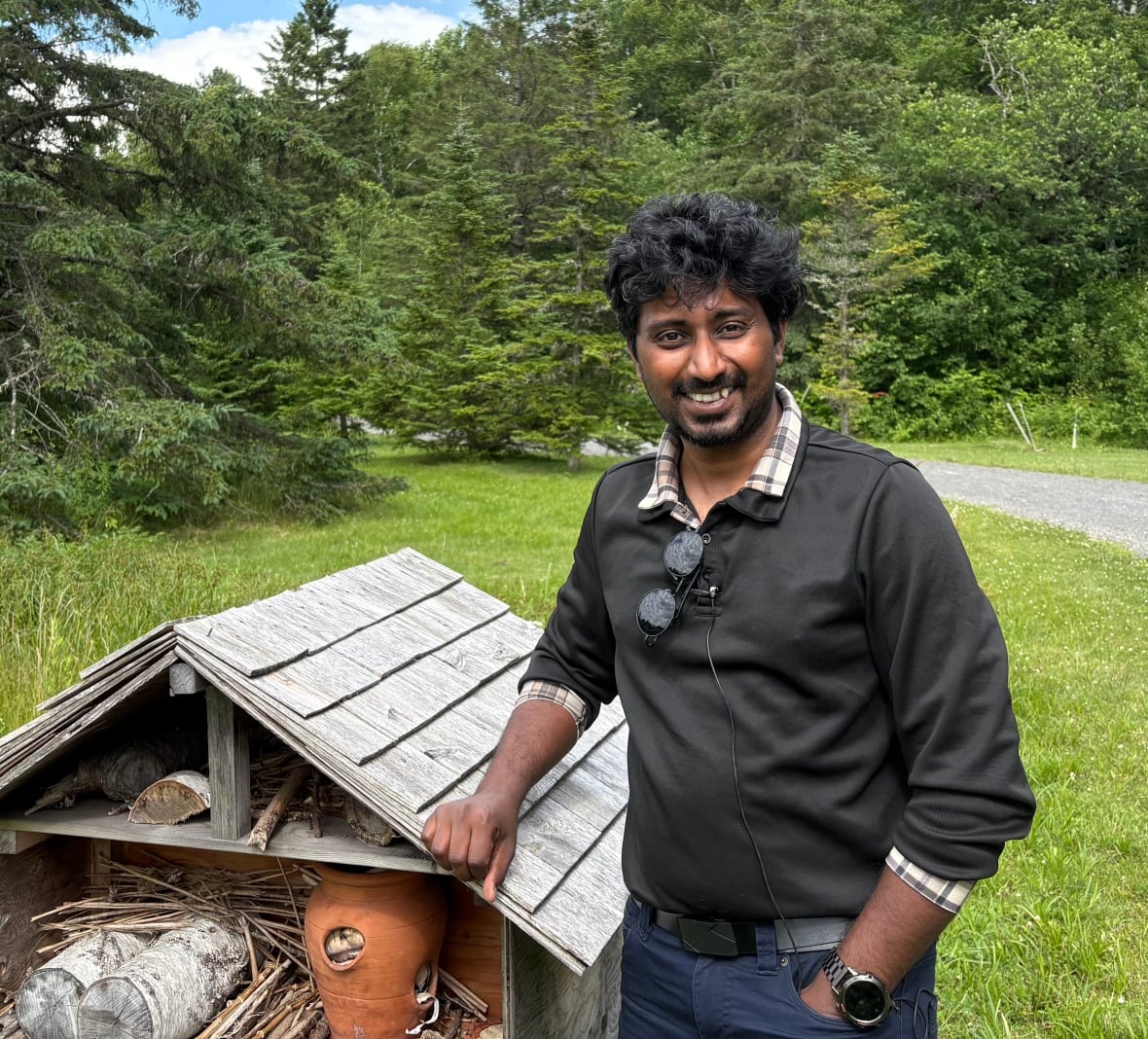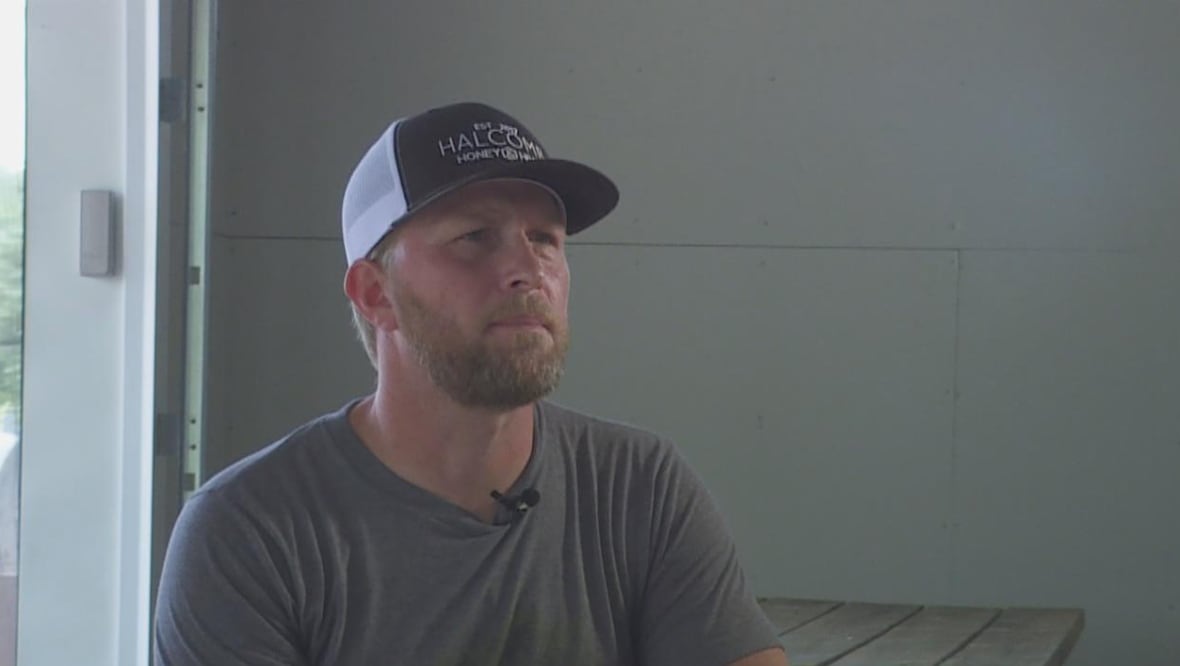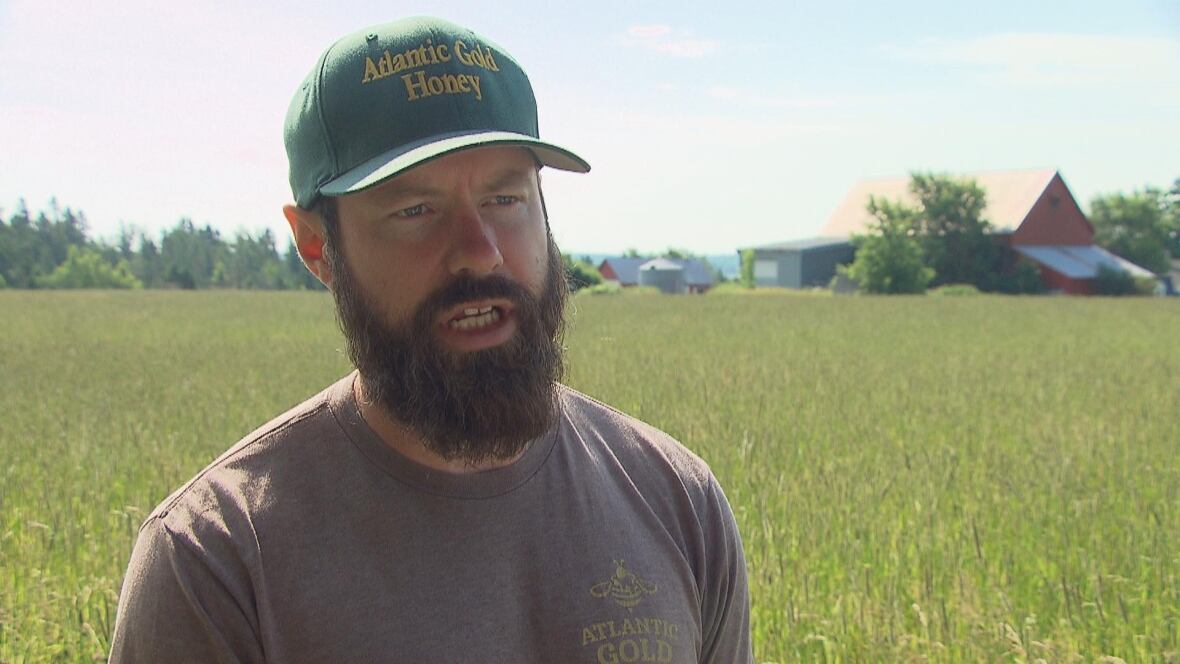[
Nathan Mutch stood in disbelief when he opened his honey bee hives this spring.
The commercial beekeeper said it was heartbreaking to discover he had lost about three million bees and all but one of 60 hives.
“It was incredibly depressing because we love our bees, just like they’re our pets,” Mutch said.
Mutch is the co-owner of Halcomb Honey & Hives, near Miramichi. He and his wife, Kristen, sell honey and products made of beeswax, and they also rent their bees to blueberry producers for pollination.
Commercial beekeeper Nathan Mutch of Halcomb Honey & Hives near Miramichi is out $50,000 after losing 99 per cent of his bees this spring.
Nathan Mutch said they would normally expect to lose anywhere from five to 25 per cent of their bees in a year.
“This was the worst year by far,” he said. “Pretty much everyone seemed to have really high losses.”
Chris Lockhart, president of the New Brunswick Beekeepers Association, said this year’s high bee loss was an issue across the province.
“I know of beekeepers that lost well over 50 per cent.”
Bee population on declining trend
Kaushal Rathnayake, a pollination biologist at the University of New Brunswick, says declining bee populations are a “widespread problem.”
According to Rathnayake, many types of bees have been in record decline in recent years because of climate change.
“The bees die suddenly without any reason because they cannot withstand our long winters, or the high temperatures or the fluctuation in temperature,” Rathnayake said.

Pascale Michaud, co-owner of AgroGene Solutions. detects infections in hives and honey bees.
“There’s not one reason why all the bees are dying,” Michaud said.
This season, she said, a lot of bees died because of viruses brought into hives by varroa mites, a parasite that attacks honey bees.
But infections are hard to predict.
“Because of climate change, we’re seeing new things appear,” she said.
If nothing is done to slow the spread of viruses, Michaud said, they will only get worse.
“I just think there needs to be more tools, more treatments.”
Honey bees and the N.B. blueberry industry
Michaud said above-average bee losses have a wide impact.
“We’re still missing thousands and thousands of hives to be able to pollinate everything,” she said. ‘So, you know, if we keep losing 30 to 50 per cent of our hives each year, it’s a big stressor on the beekeepers, of course, but really on everyone because it’s directly tied to food security.
Mutch said the blueberry industry is important in New Brunswick, “and without the bees, the blueberry industry wouldn’t really survive.”
According to Bleuets NB Blueberries, an agency representing the province’s largest blueberry producers, in 2021 the wild blueberry industry contributed $81 million to the provincial GDP.

The New Brunswick Wild Blueberry Pollination Strategy aims to increase the number of bee colonies available for pollination by 60 per cent by 2029.
But Lockhart said that because of this year’s losses, beekeepers across the province sent out less than 30 or 40 per cent of what they would normally send to pollinate crops.
The provincial honey bee expansion program can provide beekeepers with a maximum $20,000 a year to grow their operations.
Mutch said the funding helps, but it won’t be enough to meet provincial targets.
Insurance programs fall short
This year’s bee deaths also have a significant financial impact on beekeepers.
Mutch estimates he is out $50,000 between lost revenue for bee pollination rentals and the cost of replacing 99 per cent of his bees.
AgriStability is a national insurance program designed to support Canadian producers facing large income losses.
But Mutch hasn’t applied.
“You pretty much got to be a huge operation for it to really be worthwhile for you.”
Lockhart, who owns a 1,000-hive operation called Atlantic Gold Honey, applied to AgriStability, but not without hurdles.
He decided to apply after losing about 30 per cent of his bees, costing him $100,000.
“The downside about AgriStability is it takes about 18 months to get back the revenue that they’re going to support you with,” he said.
“You could be bankrupt already.”

Lockhart said only a handful of beekeepers apply to the program.
The program can be complicated to understand, so Lockhart had his accountant apply for it, which is another expense.
Agriculture and Agri Food Canada said in a written statement that they have made changes to AgriStability to make it more accessible.
The changes include increasing the coverage rate from 70 to 80 per cent, making parts of the application similar to the process of filing taxes, providing participants with their coverage notices early in the year and digital improvements making it easier for participants to communicate with staff and track their application.
“The service standard for AgriStability is to process 75 per cent of applications within 75 days of receipt,” the statement said.
The New Brunswick Department of Agriculture, Aquaculture and Fisheries said in a statement that it was exploring honey bee insurance.
In other provinces, bee mortality insurance covers 100 per cent of unexpected losses.
“It would have helped a lot of beekeepers this year,” Mutch said. “I’m hoping it comes in.”
Mutch said he now has 45 hives and so far, the new bees are looking healthy.
“When you have everything invested into it, it’s scary where it could go.”
If he loses a significant proportion of honey bees again, he might just give up beekeeping.
“I think it would just be too much of a cost and just too heartbreaking.”

